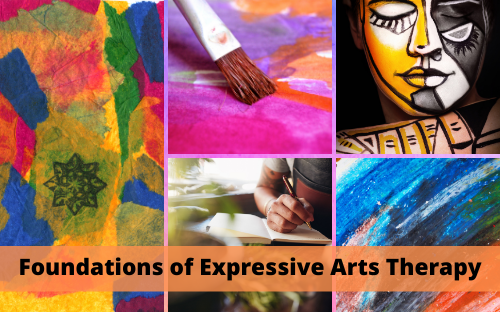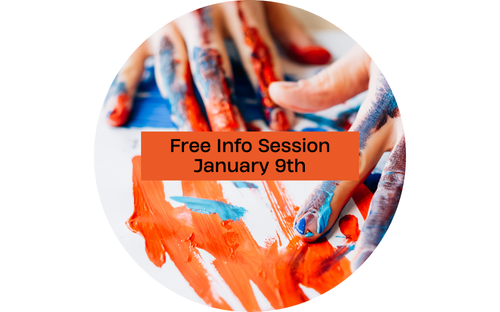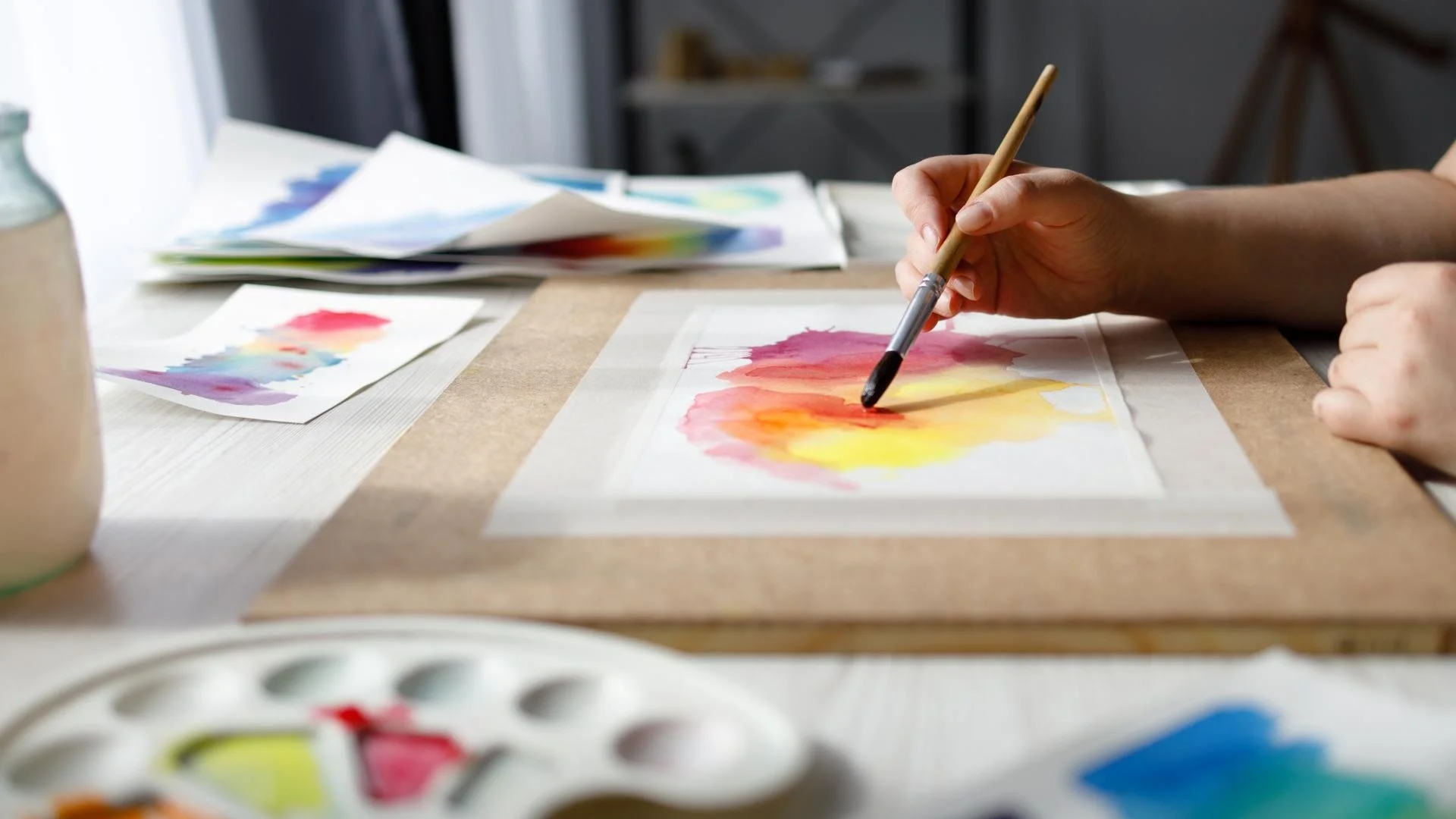Foundations of Expressive Arts Therapy
A 15-Week Training Group for Mental Health Professionals & Group Facilitators
OUR CREATIVE JOURNEY
During this training you will:
Experience the healing power of intermodal arts firsthand
Build a versatile toolkit of creative interventions
Explore EXA history, theory, and contemporary practice
Learn to apply arts-based methods in assessment, treatment, and closure
Strengthen trauma-informed, culturally responsive facilitation skills
Rekindle your creativity and clarify your professional identity
Expressive Arts Therapy is not as scary as it sounds! You do not need to identify as an artist to join. This training is based in the fundamental belief of process over product. The healing happens in the art.
“Art making is not about the end product but about the process of creating, which allows children to express what words cannot.” — Cathy Malchiodi
IS THIS TRAINING FOR ME?
This training is for psychologists, therapists, social workers, counselors, life coaches, healers, activists, teaching artists, group facilitators, and other mental health professionals.
36 Continuing Education (CE) Credits available for Psychologists, California LMFTs, LPCCs and LCSWs. Approved by the American Psychological Association
Fulfills educational requirements for the North American Drama Therapy Association (NADTA)
Naming our fears is the first step to loosening their grip. When we give words and colors to them, we begin to reclaim our power.
Expressive Arts Therapy is a multimodal therapeutic approach that integrates the creative arts with talk therapy to support healing and personal growth. By engaging the senses and exploring creative expression, individuals can process emotions, externalize challenges, and develop new perspectives. Grounded in trauma-informed practices and neurobiology, EXA helps individuals connect with their innate creativity and foster resilience.
Understanding Expressive Arts Therapy
-
No, not at all! Expressive Arts Therapy is not about creating ‘a pretty picture’, rather it is about the process of creative expression. In fact, most people think “art therapy” which uses visual art. EXA is about the intermodal use of multiple art forms. In this training, we will explore many.
All you need is a willingness to explore. This space is designed to be gentle, inclusive, and supportive, kwhether you’re speaking, making art, or simply witnessing the experience of others.
-
The term Creative Arts Therapy (CAT) was traditionally used to describe therapeutic practices focused on a single art form, such as art, music, or dance therapy. As philosophies and theoretical approaches in the field evolved, the term Expressive Arts Therapy (EXA) emerged to reflect a multimodal approach that integrates various art forms. CAT is still widely used across the field, and I use the terms interchangeably. While I am trained in “Expressive” Arts Therapy, I resonate with the word “Creative,” as it feels more approachable and less intimidating for many people.
-
EXA integrates a wide range of creative disciplines and everyday art forms, recognizing that expression can take many shapes and mediums.
Visual Arts: Drawing, painting, or collage to explore emotions and foster mindfulness.
Movement and Dance: Using the body to express and release feelings.
Drama and Role-Play: Externalizing challenges to gain perspective and insight.
Music and Sound: Creating or listening to music to soothe, energize, or express emotions.
Creative Writing: Journaling, poetry, and storytelling to process experiences and discover new narratives.
Crafts and Everyday Arts: Engaging with textiles, clay, cooking, or handmade projects as creative rituals that connect body, mind, and culture.
Multimedia and Film: Incorporating photography, digital art, and video to explore narrative, memory, and identity in modern forms of expression.
-
Neurobiology shows us the importance of “coming to our senses” when addressing trauma. As Cathy Malchiodi and Dan Siegel emphasize, the body holds the key to healing by engaging nonverbal, sensory-based forms of communication. Expressive arts therapy activates the senses to “tell the story” of trauma through implicit, nonverbal expression, allowing the brain and body to process and release emotions safely and effectively.
Frequently Asked Questions
-
Participants pay a non-refundable deposit (e.g., $50) to reserve their spot. The remaining balance is refundable if cancellation is made 7 or more days before the first session. No refunds are given after the first session. No refunds are available for missed sessions once the group has begun.
-
Yes! A $50 deposit holds your spot, and the remaining balance can be split into flexible, client-chosen payments. Full payment is due no later than 7 days before the last session. I'm happy to work with you to create a plan that feels manageable and supportive.
-
Allow youruself to have fun creating your individual creative arts studio.
In this EXA Training Group, we will engage in a wide range of creative exploration using a variety of artistic mediums. As EXA Facilitators, you will want to know firsthand the experience of working with different mediums. This is a great time to create space for your creative self to explore and play.
Below is a list of required and suggested art supplies. These supplies do not necessarily need to be the highest of quality if finances are tight. Please don't break the bank - get creative and work with what you've got! EXA Therapy is about the process, not the product.
TIP: The Dollar Store, 5 Below & Daiso are all great place to get affordable art supplies on a budget!
REQUIRED:
Multimedia Art Journal
Set of crayons and markers
Glue stick, tape, mod podge or another form of adhesive
Scissors or cutting instrument
Colored pencils
Oil or chalk pastels
Watercolor paints
Watercolor markers
Acrylic paints with brushes of various sizes (small, medium and large)
"Watercolor" or "Mixed Media" paper - 80-140lb paper features heavy sizing, making it excellent for watercolor and acrylics, as well as dry media
Plate or palette if desiring to use acrylic paint (tip: cover a plate in aluminum foil so you can easily dispose of paint afterwards)
-
No, all sessions must be attended live. Because this training is highly experiential and rooted in shared creative process, recordings aren’t available. Live participation helps maintain confidentiality, group cohesion, and the integrity of the learning experience.
-
We take a neurodiverse, inclusive approach and understand that some may need to go off camera for regulation or self-care. Still, as part of the learning process, we’ll practice being present online in ways that feel authentic and sustainable.
Have questions?
Here’s everything you might want to know: logistics, support, and how to decide if this EXA training group is right for you.
Teresa Trout, LMFT
MEET YOUR INSTRUCTOR
Teresa is a Licensed Marriage and Family Therapist (LMFT) with a specialization in Expressive Arts Therapy. Teresa has devoted her career to weaving together psychology and the arts as tools for healing, growth, and connection. Teresa holds an M.A. in Counseling Psychology with a concentration in Expressive Arts Therapy from the California Institute of Integral Studies, and a B.A. in Visual Arts from UC San Diego.
Her work is rooted in the belief that creativity is a powerful force for transformation and that healing happens in connection. She seeks to co-create spaces where creativity becomes a bridge to self-discovery and resilience. Her work integrates intermodal practices to support both personal exploration and professional development. Alongside her clinical practice, she designs and leads trainings and workshops that nurture facilitators, therapists, and community leaders in bringing expressive arts into their work. Her practice is affirming, trauma-informed, and inclusive, with particular expertise in supporting LGBTQ+ individuals, those in BDSM/Kink and Non-Traditional Relationship communities, and people navigating diverse life experiences. When she is not working, she likes to spend time with family, play board games, be in nature, go on random adventures, and watch a good cult or crime documentary.












